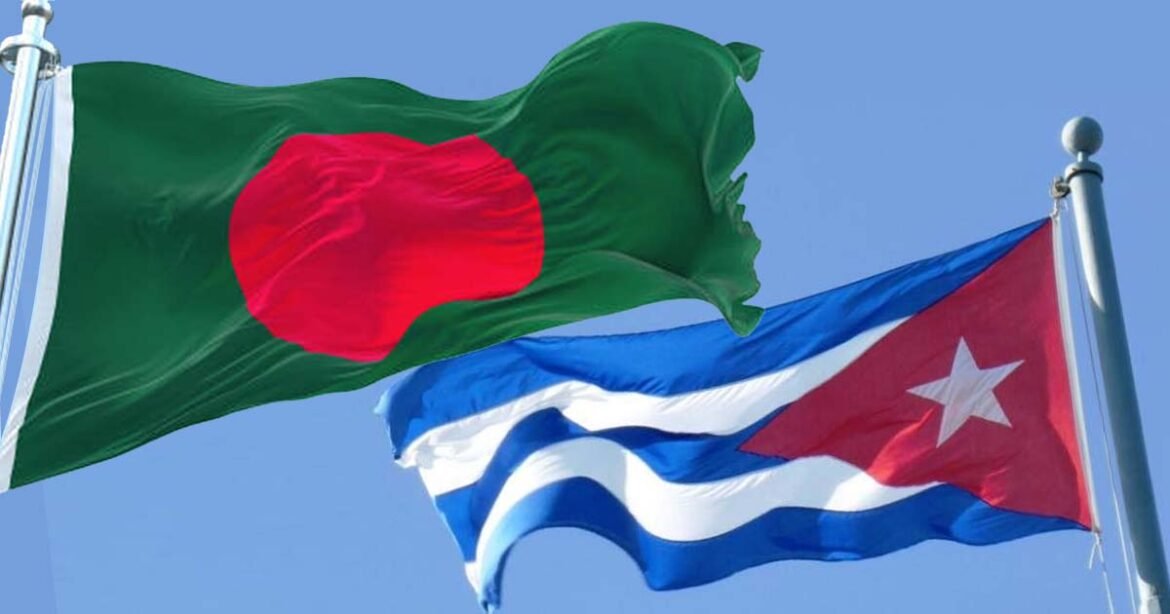Cuba has recently demonstrated its eagerness to enhance bilateral trade with Bangladesh, building upon the strong political relations that exist between the two nations. During a meeting between the Cuban Deputy Minister for Foreign Trade and Investment and the Bangladesh High Commissioner to Canada, Dr. Khalilur Rahman, who also serves as the ambassador to Cuba, the Cuban government expressed its desire to strengthen trade relations.
You can also read: How USA toppled Gulf nations for foreign remittance inflow in Bangladesh?
During the meeting, the Cuban Deputy Minister for Foreign Trade and Investment specifically requested Bangladesh to send a high-powered trade delegation to initiate discussions and lay the groundwork for future trade collaborations.
Expanding trade relations for mutual prosperity
The Bangladesh envoy recently engaged in discussions with the Ministry of Commerce, conveying Cuba’s interest in strengthening bilateral trade between the two nations. Steps were requested to facilitate this process. Furthermore, the envoy held a meeting with the president of the Cuban Chamber of Commerce to explore avenues for promoting trade cooperation.
The Cuban deputy minister highlighted that Cuba is undergoing significant economic reforms, allowing private businesses to operate in most sectors. Under a recently implemented investment act, Bangladesh has witnessed the registration of over 7,000 new enterprises, offering distinct prospects for local businesses.
During the visit, the Bangladesh ambassador visited prominent Cuban enterprises, including CIMEX and CARACOL, to assess possibilities for exporting garments and leather products from Bangladesh. The management of these companies expressed interest in exploring trade opportunities and requested a catalogue of Bangladeshi ready-made garments (RMG) and leather products for potential importation.
Moreover, the Cuban market may present an opportunity for Bangladeshi jute fibres, as Cuba is set to commence operations of two large jute mills for fibre processing, leading to increased demand.
To facilitate further discussions, the president of the Cuban Chamber of Commerce and the Bangladesh envoy agreed to initiate virtual discussions between the chambers of both countries.
Earlier, former Bangladeshi President Abdul Hamid emphasized his country’s eagerness to enhance ties with Cuba across various sectors. This statement came after receiving the credentials of Cuban Ambassador Alejandro Simancas.
These efforts reflect the commitment of Bangladesh and Cuba to explore and enhance trade relations, leveraging the economic reforms in Cuba and the potential for Bangladeshi industries to tap into new opportunities.
Bangladesh-Cuba trade Analysis
In 2015, Bangladesh’s exports to Cuba amounted to $1.93 million. Unfortunately, specific details about the main exported products from Bangladesh to Cuba are not available. However, it is noteworthy that over the past 19 years, Bangladesh’s exports to Cuba have displayed a positive growth trend. With an annualized growth rate of 24.1%, exports increased from $31.9k in 1996 to $1.93 million in 2015. It is important to mention that no services were exported from Bangladesh to Cuba in 2015.
In the same year, Cuba’s exports to Bangladesh were valued at $256. Similar to the previous case, there is no information available regarding the main products exported by Cuba to Bangladesh. Interestingly, over the last 19 years, Cuba’s exports to Bangladesh have experienced a declining trend. With an annualised growth rate of -23%, exports decreased from $37k in 1996 to $256 in 2015. Just like the Bangladesh side, Cuba did not export any services to Bangladesh in 2015.
In 2021, Bangladesh held the 101st rank in the Economic Complexity Index (ECI) with a score of -0.85. This index measures a country’s economic diversity and complexity. Additionally, Bangladesh secured the 56th position in total exports, amounting to $51.8 billion in 2021. Conversely, in the same year, Cuba ranked 158th in total exports, with a value of $1.09 billion.
Based on the provided data, it is evident that Bangladesh has shown a higher volume of exports and a relatively higher level of economic complexity compared to Cuba. Bangladesh’s exports to Cuba have demonstrated a positive growth trajectory, while Cuba’s exports to Bangladesh have experienced a decline over the past two decades.
Potential trade prospect amid strained US relations
Bangladesh and Cuba have a strong bilateral connection with each other, predating the former’s independent struggle. Cuba recognized Bangladesh in 1972 immediately after its victory in the independence war. The Cuban revolutionary leader Fidel Castro was an admirer of Bangabandhu Sheikh Mujibur Rahman. Both leaders met in 1974 at NAM Summit held in Algiers.

In the same year, Bangladesh signed a treaty to export jute bags to Cuba. This enraged USA, which had hostile relations with Cuba to oppose its Marxist government. The USA canceled a food aid programme to Bangladesh which was one of the most prominent causes of a famine that devasted Bangladesh.
Bangladesh stands to gain from increased trade with Cuba, as it would provide an opportunity to tap into a growing market. Cuba’s expanding middle class and rising demand for goods and services from Bangladesh, such as ready-made garments, pharmaceuticals, and healthcare services, create avenues for economic growth. The diversification of trade partners could bolster Bangladesh’s economy and generate employment opportunities, contributing to overall prosperity.
Nevertheless, there are concerns that heightened trade relations with Cuba may strain Bangladesh’s relationship with the United States. The US has long held a hostile stance towards Cuba, and any increase in trade between Bangladesh and Cuba could be perceived as a threat to US interests in the region.
Experts suggest that careful consideration is needed to manage the potential advantages and disadvantages of increased trade between Bangladesh and Cuba. While diversifying trade partners is beneficial for Bangladesh, the risk of exacerbating tensions with the US should not be ignored. Balancing economic opportunities with diplomatic considerations will be crucial to navigate this complex situation successfully.


